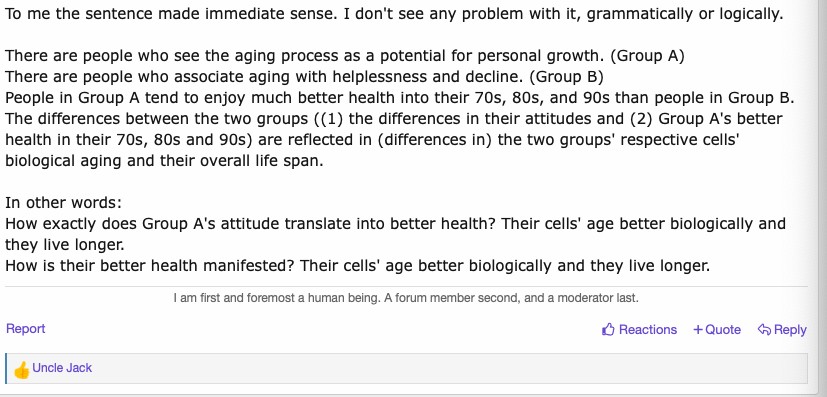既然是讨论我也说说我的看法:
原句出自:
https://www.theguardian.com/science/2022/jan/02/can-you-think-yourself-young-ageing-psychology
According to a wealth of research that now spans five
decades, we would all do well to embrace the same attitude – since it can act
as a potent elixir of life. People who see the ageing process as a potential
for personal growth tend to enjoy much better health into their 70s, 80s and
90s than people who associate ageing with helplessness and decline, differences that are
reflected in their cells’ biological ageing and their overall life span.
我觉得,这里的differences是同位语结构,但是若说成是“分句的同位语”(这个说法见章振邦“新编高级英语语法”的第634页最下面),为什么用复数differences,而不是用a difference;若说成是简单的“名词词组+名词词组”,那前面的名词词组在哪里?没有。
我觉得这里用复数differences,最好不要理解成“......,which are differences......”结构,因为这里的which指代什么?指前面整句吗?那应该用a difference;若是说只指代一部分,请问是哪一部分?没法搞!
注意下面句子的用法指代是很明显的,可看作是“名词词组+名词词组”,可以对比:
1.Untouched means 'not touched', but with the difference that it is one word and not two, a difference
that in some circumstances is important.
2.During the last two years, since the outbreak of the war, there have
been amongst us differences of opinion as to its origin, as to the causes
which led to it,—differences which have been deep- seated, far-reaching, and acute.(有个破折号就很明显了)
3.In this chapter I shall limit myself to a few examples, mainly taken
from the “effect” list, to show the dimensions and the magnitude of the logical differences we encounter there, differences which have been largely ignored throughout
the long history of the problem of causal relations.
4.It seems perverse that differences in spelling should be maintained for so many of
them – differences which may get the better of otherwise excellent
writers.(有破折号)
5. From the figures in
Bean (1983: 129), one must infer that there is a gradual decrease in
verb-finality between Alfred's Letter on Learning and the time of Wulfstan and
Elfric — except that the Orosius is very
different from the Letter and from the later prose, a difference which one must attribute to stylistic
level.
回到问题中的句子。前面分析过,尽管没法指代,但可以把differences同位到前面句子中的意思之中,因为逗号前面的句子是一个比较级的句子,有比较自然就有差异。至于为什么用复数的differences是因为后面分句中是两个方面“in their cells’ biological ageing and
their overall life span.”也就是说用复数是由后面的限定分句决定的,而不是理解成相当于which结构。
空说无凭,举两个很相似的例子,选自权威原版书籍:
6.So the score for DO in
the extract is closer to 0/12 than 0/31, a
kind of difference which may be
important overall.
这句前面部分有比较。
7. As mentioned above,
we usually pluralize an English noun by adding -s in the written form (and /z/,
/s/, /əz/ in the phonetic form, differences that you can hear if you say the
following nouns out loud –dogs, cats, bushes).
这句很典型,前面甚至连比较都没有,但意思中体现出比较:“加s发音差异”。用复数differences是表示dogs, cats, bushes这三个词的发音差异。
不妥之处请见谅。









